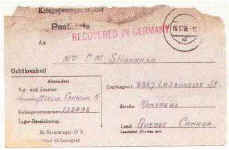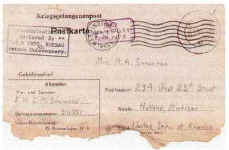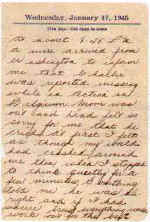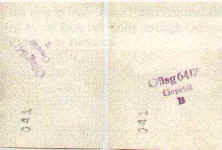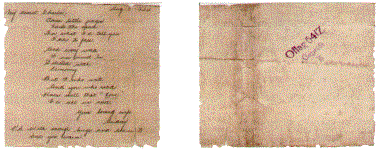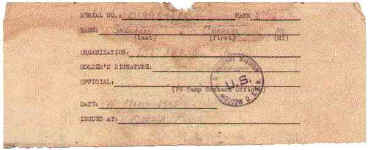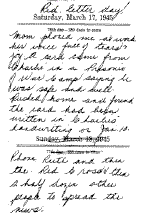|
Hyperlink Footnotes= # |
||||||||||||||||||||||||||||||||||
|
|

|
|||||||||||||||||||||||||||||||||
|
|
I guess the best way to tell you what I know about dad's experience during the Battle of the Bulge is to just go chronologically or at least the way it would seem to me, with what he told me. His battlefield commission was one of the things I wanted to know more about. He told me very little of the actual event, or maybe there just isn't that much more to it. I had never heard of such a thing, and being exposed to the military all my life found it very interesting. At the time he told me about it he said he was in an area with a few other men. He said that a soldier came (I think he said an officer) and asked who the most senior enlisted man was. My dad answered that he was and the soldier asked him to come with him. He said the soldier took him to see, I believe he said a Major, I don't remember if he told me his name or not. He said the Major told him to take off his stripes and put on 2nd Lieutenant bars as he was being given a commission on the spot. That's really about all dad told me about his battlefield commission. When I was about 14 or so, I saw his prisoner of war dog tag given to him by the Germans. My mother does not have it by the way. I think my brother Brian has it, but I haven't heard from him yet on it. My dad had the dog tag hanging in front of his desk when we lived in Steilacoom. I asked him what it was and he told me. I asked him how he got captured and the only thing I can remember him saying was that they were completely surrounded. He told me about being a Forward Observer and a Ballistics Officer. I asked him what ballistics meant and he began to explain about it. I didn't understand the need for knowing how long a shell flew through the air before striking the target. He gave me two examples. He told me about one instance when he was assigned to watching a crossroads out in front. He said he was monitoring a troop movement headed towards him. It consisted of several tanks and I believe he said about 2000 Germans. He reported the movement and the decision was made to open fire on the Germans when they reached the crossroads. 1 He started explaining to me all the calculations that have to be taken in to consideration so when the first Germans and tanks were just crossing the road, the shells fired from behind him would strike on target, on time. I asked how long does it take for a shell to fly that far. He said that particular instance he didn't remember, but he did remember a German ammo dump they destroyed. He said they had found a German ammo dump with some Germans guarding it. I think he said it was a night. The reason I think that is because I remember him telling me about there was a German guard kept pacing back and forth, from where the ammunition was, to where the other Germans were. There was a small light by where the ammunition was. He said the place was quiet, no activity except for the Guard pacing backing and forth. He sat there and did his calculations as to how long the German was taking on his walk. Then he factored in the time of flight of the artillery shell behind him. He remembered that the shell would take 22 seconds from the time it was fired, to the time it impacted the target. He relayed the coordinates, and calculated exactly where the German would have to be when they fired the guns. He told them when to fire, the German turned around and headed back, and as he marched towards the ammunition dad said he heard the shells flying overhead. Just as the German reached the ammo dump the shells began to impact. "That's ballistics" he told me. I remember his response to me when I said, "Well, I bet the Germans woke up then, huh?" He chuckled a little and said, "Yep, there was quite a bit of activity around there after that!" Again, I don't know the exact time or instance that meant his capture, or who he was with. That is one question my sister has asked repeatedly. Was anyone with dad when he was captured? Where exactly was he? I told her dad never told me that, but I would ask you. 2 The next thing on the chronological clock that I became aware of is when dad was standing in the kitchen in our house when we lived in Steilacoom, WA. I was getting a cup of coffee, I think I was about 20, just before I went in to the Air Force. I can still see him as clear in my mind today, like it was yesterday. He was wearing a white T-shirt and he was scratching his chest. All of a sudden his wedding band snapped and hit the floor "ting....ting....ting". He looked down and laughed and said, "Weeeelllll!". "What?", I asked him. He said, "I remember when the Germans were going to cut my finger off to get this ring". "You gotta be kidding?" I said. "Why?" He said when he was captured, the Germans took everyone's jewelry, gold, watches, etc. The only reason he kept his wedding band is because he had gained a little weight, and his already tight wedding band became stuck on his finger. The German officer that was processing him took him to the commandant of the camp about it, and he told him if he didn't get the ring off, they were going to cut his finger off to get it. Dad said he tried, used soap, but it only made his finger swell up and make it tighter. Well, dad kept all ten fingers. Dad originally started out in Stalag IV-B in Germany, 3 but at some point in time after January 10th, 1945 he was transferred to Oflag 64-Z 4 in Poland. On January the 10th, dad was able to get a couple of German postcards back home and get word to the family he was ok. If I remember correctly, the prisoners were actually only allowed one postcard each, mom explained. I would suspect that the Red Cross had something to do with paying for them, I don't know for certain. You would think that the Germans wouldn't pay for them, however. Anyway, the reason dad sent two is because he had become friends with an Australian Air Force pilot in the same Stalag as he, but the Aussie didn't have any kin to write home to (at that time) so he sent his card on dad's behalf to my mother. The next two photos you see, are the front and back of the original postcard the pilot sent to my mom. It's dated 10-1- 45(10 Jan '45), and this is what it reads as its fainter here.
Mom kept this all these years, because the day she got it was one of the happiest days of her life, as I will show you a little later on. I'm sure the amount of time these postcards took to get back to this side of the world, gave a whole new meaning to "snail mail". The next two photos you see are of the original postcard that my dad sent to his mom and sister.
Again, this one is dated January 10, 1945. This one is written by my dad as you can see.
My family has always gotten a big laugh about his cigarette request over the years. Mom and dad laughed about that for as long as I can remember. He didn't want them to worry, he just wanted lots of cigarettes. He used to tell me the reason he asked for more than he would personally smoke is because the Germans would keep the majority of them when they arrived. Any others were shared with fellow prisoners. A week later was one of the saddest days of my mother's life, as she got word my dad was missing in action. She told me that she was at home with her father when a knock came at the door and it was a Western Union Telegram. My mother kept a diary in those days, and from the time my dad was reported missing to the time he returned home, my mother tore out the pages and has kept them over the years as well. On the next page is her entry from Wednesday, January 17th, 1945. Below is what her entry says.
Sometime soon after dad sent the postcards from Stalag IV-B he was transferred to Oflag 64-Z in Poland.5 My cousin Ward in Montana feels this prisoner of war camp was in Czechoslovakia from my father's description to him. But, my fathers Resume Of Military Service which I have clearly shows Poland. Perhaps you can clarify. My cousin Ward (the son of my fathers oldest brother) said in an e-mail to me just recently when I was asking about "dad's war stories" a few comments about his transfer to this second prison camp. He said "....Your Dad also told my Dad and me about walking to Czechoslovakia as a prisoner of war with a 'PW' painted on the back of his jacket. The Germans would walk them alongside troop trains to discourage the American P-47s and British 'Typhoons' from strafing the trains. It worked with the Americans but not the British. Charles said: 'When you saw one of the Typhoons start his run, everybody "hit the ditch" and they blew the train off the tracks and killed a few GIs too boot'...." My dad had a couple of pictures of my mother with a poem he carried with him on to the battlefield. When he arrived at the new prisoner of war camp, I guess they registered these items by a camp stamp on the back of each. Not sure why they didn't in Germany, but this is what they looked like.
By account of my dad's Resume Of Military Service, his last day as a prisoner was January the 29th, 1945. He, and the rest of his prisoner of war camp, got quite a scare the morning of the 30th. He told me that every morning, and during the night sometimes, the Germans would muster them for role call. He said this particular morning he just woke up. He said they were not called out by the Germans for role call, and it was getting late. He told me they were all becoming quite concerned, as they had several prisoners come in to the camp that brought in stories of Germans murdering American and allied soldiers in cold blood. They were beginning to fear this is what the Germans were planning for them, as the Germans knew things were going poorly for themselves in the war. Dad told me they were just sitting inside waiting and they heard a soldier walk up to the door of the building they were in. The door opened, and it was a Russian soldier. When they went outside and the only people they saw beside themselves was the Russian Army, they knew it was over.
What happened from there until he got on the ship in Italy, I'm a little confused as to the sequence of events. I know that dad was repatriated by the Russian Army through Odessa, Russia. This is dad's identity card for himself until he got to America. But, my cousin Ward seems to have more detail from the time he was released, to the time he made it to Vienna, than I do. He writes in his last e-mail to me: "....he also told us about being liberated by the Russians.....He picked up a Russian machine gun and followed the Russian Army into Vienna. I remember him telling about that trip in some detail, but this message is getting a little too long already...." I've asked my cousin to continue where he left off. I'll find out as much detail from him on that trip and relate it to you a little later on. On March 17th, 1945, over two months from the date my dad sent out the postcards from Germany, one of them arrived at my mother's house. As follows:
Mom said, her mom said, "Leave it to an Irishman to make himself known on St.Patrick's Day". My grandmother is full blooded Scotch. From the end of March, till almost the end of April 1945, dad was on a ship in transport back to America. He kept a log of his journey on a small booklet which I have several of the pages. They are some what deteriorated, but readable for the most part. Dad went on to have several commands of his own over the years, including Korea. He was always proud of our country, and was very honored to have served for so long. |
|||||||||||||||||||||||||||||||||
| For problems or questions regarding this web contact: dcooper1924@comcast.net. | ||||||||||||||||||||||||||||||||||


